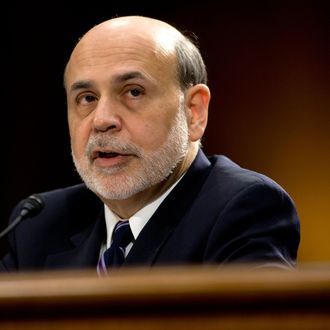
Lots of people have lots of opinions about Wall Street bonuses (too big!) and how to fix them (cap them!), and some people are even doing the things they think will fix them — like in Europe, where a new law is about to limit bonuses to 100 percent of salary for almost everyone working at a big bank.
Our very own Federal Reserve has mostly stayed out of the bonus discussion, preferring to spend its time talking about things like the relative merits and drawbacks of peeing in bed. But now that Europe is up in arms about banker bonuses, it’s feeling left out. And so today, we have the news that the Fed has some suggestions for Wall Street banks about paying their people. Namely: Stop competing with each other! It’s kind of like youth soccer.
According to Reuters:
The Federal Reserve is pushing banks to ignore competitors’ performance when awarding bonuses, and focus squarely on their own profitability, according to pay consultants and other people familiar with the matter.
The central bank is hoping to change a deeply ingrained habit on Wall Street: awarding bonuses to senior executives based in part on whether the company’s performance lagged or beat rivals.
What the Fed is pitching is an egalitarian bonus scale, more or less, designed to reward everyone in good years and punish everyone in bad years. So basically, instead of looking at the league tables at the end of the year, and going, “Okay, Bob, your division beat Citi but lost to Goldman, so we’ll pay you less than your counterpart at Goldman but more than your counterpart at Citi,” whoever sets the comp levels at Morgan Stanley would go, “Well, Bob, you had your best year ever, but because of Basel/Dodd-Frank/M&A slowdown/rogue trader the firm lost a lot of money, so here’s your Starbucks gift card. Try the cake pops.”
Which sounds sensible enough. After all, why should firms that are on the verge of death be paying out huge bonuses, even if they do have a few stars? Shouldn’t the fates of individuals rise and fall with the fates of their firms as a whole?
Maybe, but I still don’t love the Fed’s suggestion. First, it doesn’t really square with the fact that bonuses on Wall Street are by their very nature a competitive enterprise. (You don’t pay a trader $5 million because he did a good job; you pay him $5 million so he won’t go work for Goldman.) If only the most profitable banks on Wall Street are allowed to pay their top performers well, eventually all the talented people will move to the profitable banks, and the unprofitable banks will be stuck with a bunch of schmoes. (This sort of happens already, but not so starkly.)
Second, the rise-together, fall-together approach could result in some people getting bonuses they don’t deserve, simply because their firm had a better-than-expected year. If J.P. Morgan’s London Whale loses $6.2 billion on a botched trade, but the bank still makes record profits of $23 billion that year, should he get to keep his bonus?
There’s probably some way to scale back the keeping-up-with-Goldman nature of bonuses without rewarding mediocrity, by breaking out profits per group or somesuch. But is it even worth it? After all, we’ve seen in Europe that bankers confronted with statutory limits on their pay will find ways around those limits. Surely, American bankers are no less inventive.




























